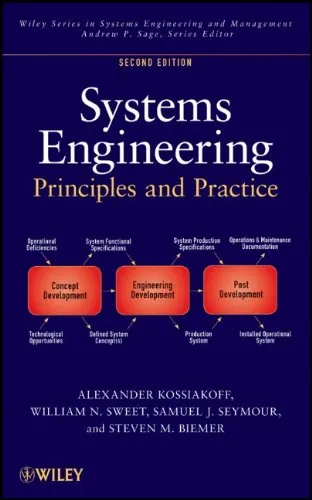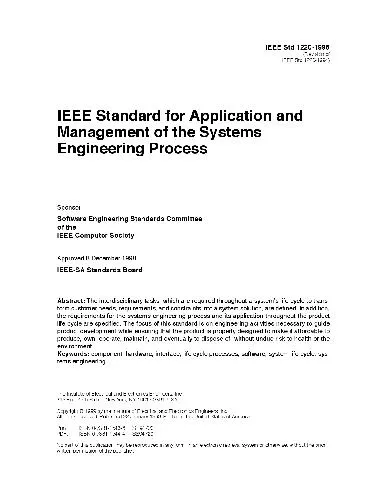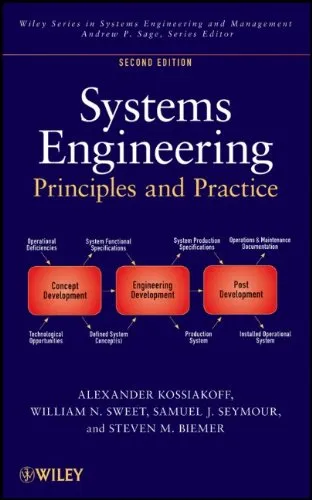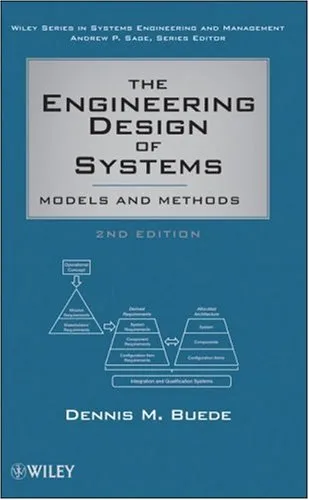Systems Engineering Principles and Practice (Wiley Series in Systems Engineering and Management)
4.5
Reviews from our users

You Can Ask your questions from this book's AI after Login
Each download or ask from book AI costs 2 points. To earn more free points, please visit the Points Guide Page and complete some valuable actions.Related Refrences:
Introduction to 'Systems Engineering Principles and Practice'
Welcome to a comprehensive guide to understanding and applying systems engineering in modern projects. With 'Systems Engineering Principles and Practice', you are about to explore the methodologies, processes, and essential principles necessary to design complex, high-performing systems effectively and efficiently.
Detailed Summary of the Book
The book covers a wide array of concepts integral to systems engineering. It begins with an introduction to the discipline, defining systems engineering and its importance in orchestrating complex systems. It adeptly traverses through the lifecycle of systems engineering, from the initial conceptualization and analysis phase to design, implementation, testing, operational support, and eventually, retirement.
Readers will find practical insights into systems thinking, the intersection of technical and management processes, and how to maintain a user-centric approach amidst the technological intricacies. The authors emphasize the necessity of understanding customer needs and system requirements, followed by an astute discussion on systems architecture and modeling techniques.
The book also addresses the often-overlooked areas of risk management, performance measurement, and systems engineering management. Each chapter is imbued with real-world examples, case studies, and illustrative diagrams to aid learning and comprehension, ensuring that complex theories are accessible and applicable to a variety of sectors.
Key Takeaways
- The quintessential role of systems engineering in managing complex projects from conception to disposal.
- Vital strategies for integrating and aligning technical and managerial teams.
- Approaches to risk assessment, lifecycle cost management, and sustaining system value over time.
- The importance of stakeholder engagement, requirements engineering, and maintaining focus on delivering customer value.
- Insights into evolving trends in systems engineering and the impact of emerging technologies and practices.
Famous Quotes from the Book
"Systems engineering is the art and science of creating whole solutions that meet the needs of users and stakeholders within the constraints of the project's environment."
"A true systems engineer embraces the complexity of integrating varied components into a cohesive and high-functioning solution, transforming potential chaos into structured simplicity."
Why This Book Matters
In today's intricate technological landscape, where every industry faces challenges akin to managing multifaceted systems, 'Systems Engineering Principles and Practice' serves as an essential educational resource. It addresses the urgent need for a structured approach to managing complexity, ensuring that technologies and processes align with overarching business and operational objectives.
By equipping systems engineers, students, and practitioners with the tools and insights needed to foster innovation while safeguarding reliability and performance, the book cultivates a new generation of thinkers who can adeptly navigate and excel in diverse fields such as aerospace, automotive, IT, healthcare, and beyond.
Throughout its pages, this book underscores the prominent role systems engineering plays in reducing risks, enhancing customer satisfaction, and ultimately driving successful project outcomes in a world increasingly dependent on sophisticated, interconnected systems.
Free Direct Download
You Can Download this book after Login
Accessing books through legal platforms and public libraries not only supports the rights of authors and publishers but also contributes to the sustainability of reading culture. Before downloading, please take a moment to consider these options.
Find this book on other platforms:
WorldCat helps you find books in libraries worldwide.
See ratings, reviews, and discussions on Goodreads.
Find and buy rare or used books on AbeBooks.
1487
بازدید4.5
امتیاز0
نظر98%
رضایتReviews:
4.5
Based on 0 users review
Questions & Answers
Ask questions about this book or help others by answering
No questions yet. Be the first to ask!














